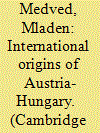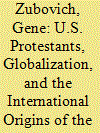| Srl | Item |
| 1 |
ID:
191671


|
|
|
|
|
| Summary/Abstract |
This article examines the emergence of Austria-Hungary from the perspective of uneven and combined development (UCD), which unifies social and geopolitical modes of explanation. It argues that UCD can explain the ‘paradoxical’ role of Hungary, a relatively backward society that was at the forefront of the 1848 revolutions and the political reorganisation of the Austrian Empire in 1867. However, it maintains that potentials of UCD have not been realised even in recent UCD interpretations of the Monarchy due to declinist assumptions. The article argues that the international management of UCD via the Concert of Europe inflated Austrian power, but could not prevent sociopolitical change, laying the ground work for its later deflation. The Austrian Empire also faced the challenge of revolutionary Hungary. The article demonstrates that its intersocietally generated peculiarities resulted in the gentry initiating the transition to capitalism to counter the geopolitical threat of industrialising Austria and arrest its social decline. Despite defeating Hungary and introducing capitalist social relations, the strength of Austrian dynasticism prevented the emergence of a hegemonic bloc and political stabilisation. It was this political weakness rather than economic backwardness that might better explain its expulsion from Germany in 1866. The article then turns to a comparison of the political economies of Prussia/Germany and Austria-Hungary and questions the overemphasis on Austro-Hungarian backwardness. By offering a new interpretation of Austria-Hungary, the article contributes to a rethinking of nineteenth century international relations and the long-term causes of World War 1
|
|
|
|
|
|
|
|
|
|
|
|
|
|
|
|
| 2 |
ID:
179065


|
|
|
|
|
| Summary/Abstract |
Between World War II and the 1960s, Americans’ sense of what constitutes living in a democracy had transformed. Activists in the left-liberal tradition rejected the status quo and became impatient with slow-paced change, emphasized grassroots participation, and called for racial inclusion. The changes in democratic practice were most pronounced among baby boomer youths, who participated in the free speech movement, in the sit-ins and civil rights marches, in anti-war protests, and in the sexual revolution.
|
|
|
|
|
|
|
|
|
|
|
|
|
|
|
|